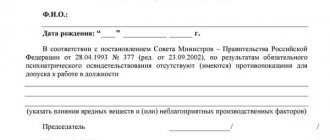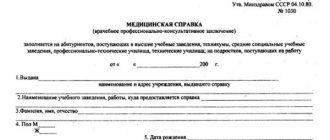Home / Labor Law / Employment / Hiring
Back
Published: June 28, 2016
Reading time: 9 min
0
4026
In a highly competitive employment environment, employers are using increasingly stringent measures to screen potential employees. One of the selection methods that is increasingly common among most companies is internship.
The purpose of its implementation can be different - testing the employee’s knowledge, training him in practice, selecting the best candidate. However, it is important that this procedure is formalized in accordance with the law. Therefore, more details about the registration procedure, required documents and payment features are given later in the article.
- Legislative regulation and the need to carry out
- Admission conditions
- Duration
- Registration procedure
- Payment Features
- Making a decision based on the results of the internship
- What do you need to remember about driver training?
Internship – benefits for beginners and experienced
An “internship” is a special training course with a predominant number of hours of practice, aimed at obtaining new professional skills that a specialist will need in his future career. This is a very broad concept, including both short “express” classes to master a specific skill, and long-term training that creates a comprehensive understanding of the profession.
Well-organized professional training significantly improves the professional qualities of any specialist. At the same time, an internship carried out “for show” brings nothing to employees and employers except wasted time.
It is possible to arrange an internship at the workplace, as well as in a special educational institution or in another organization. Existing specialists must be involved in conducting such classes, since the practical part is the main component of any training course.
Well-organized professional training significantly improves the professional qualities of any specialist.
Legislative regulation and the need to carry out
The legislation does not provide for separate provisions specifically dedicated to internships.
In Art. 59 of the Labor Code of the Russian Federation only provides for the possibility of concluding a fixed-term employment contract if an employee is hired for a short period of time (less than two months). Also, an internship can be considered work during a probationary period, based on the results of which a decision is made to employ the candidate or to refuse him. The probationary period is regulated by Art. 70 Labor Code of the Russian Federation.
Therefore, at enterprises that practice such tests when hiring, there must be a separate document regulating the conditions for their conduct. For example, this could be “Internship Regulations”.
Also, conditions regarding this may be contained in the Collective Agreement and issued by a separate order.
The terms of the trial must be included in the employment contract with a specific employee.
Typically, an internship is carried out in the following cases:
- In relation to young specialists who have just graduated from an educational institution and do not have practical work experience. In this case, the internship will be a type of educational process, but more specific and aimed at a specific type of activity.
- With a lot of competition for the position. This option is practiced by many large and prestigious companies when they have a vacancy. In this case, several candidates are accepted for an internship; after completion, only the one who showed the best results gets the job.
- For employees who change their type of activity. Such candidates may have practical work experience, but only in a different field. The test is carried out to give them practical skills in a new job.
- According to the terms of the concluded student agreement. This includes situations where interns are trainees from educational institutions. After completing the internship, they can either leave the place of work or get some kind of position there.
In some cases, internships are also used for not entirely legal purposes, accepting candidates for temporary free or cheaper work.
To avoid getting into such a situation, the applicant should take care of the correct documentation of the procedure.
Legislation regarding vocational training - occupational safety and health in the workplace
Russian legislation does not contain many rules regarding internships. You can note Article 212 of the Labor Code, which regulates the procedure for ensuring safety in the workplace. This norm classifies internships in the field of labor protection and does not allow employees who “have not undergone special training” to begin performing their official duties.
Internships on labor protection in the workplace, as a rule, are fully carried out only at those enterprises where harmful or dangerous working conditions are established. A responsible employee is appointed for its implementation, and completion of labor protection training is recorded in special documents.
In organizations where work activity is not hazardous, labor safety training is usually a purely formality and comes down to brief information about the evacuation plan, emergency exits, rules for handling electrical equipment, and the location of fire extinguishers.
Payment and accounting of intern work
The intern's remuneration is made on the basis of the formalization of the employment relationship between the intern and the organization's management. This is possible by concluding one of three possible agreements:
- Civil;
- Fixed-term labor;
- Indefinite employment.
The above contracts must contain information about the remuneration for the applicant’s work. Otherwise, payment is made at the minimum rate for labor in this industry.
It is most fair and expedient to combine an internship with a probationary period so that employees can receive payment at the rates of the probationary period.
Students undergoing practical training at the enterprise do not receive payment for their work.
Documentation of industrial training and internship
If practical training is planned at the enterprise, to begin it it is necessary to prepare:
- order for conducting training events, including a list of participants;
- program of training events;
- certificates of completion of the training course.
If the internship is planned at an educational institution or in another organization, it is necessary to document the employee’s absence from the workplace for valid reasons with a special order, on the basis of which the accounting department will calculate his average salary.
How is the training period paid?
During the internship period, the salary is determined by the employment contract. Its size depends on reaching mutual agreement of the 2 parties - the trainee and the employer. This has its own characteristics:
- the amount of payment is minimal (usually equal to the minimum wage);
- unscrupulous HR department employees do not officially register and do not set the salary level for the duration of the internship;
- One-time payment upon completion of internship.
Need to know! The internship is paid in accordance with the requirements prescribed in Article 204 of the Labor Code.
Who benefits from special training: from students to professionals
Most often, the need for practical training is encountered:
- Students - for credits on production (working, educational) internships and gaining professional experience for further employment.
- Beginning specialists and newly employed workers - to form an idea of future responsibilities in the workplace.
- Employees when expanding the list of responsibilities or delegating new powers - to master new skills, techniques for working on new equipment.
Obviously, the list of those who may need an internship includes virtually all people pursuing careers in a variety of fields. Who is exempt from internships and industrial training? As a rule, by decision of the employer, specialists who possess all the skills covered by the internship can be exempted from this activity . Also, training may be canceled or postponed due to personal circumstances.
In fact, an internship can be necessary for all people building a career in a variety of fields.
Problems with interns
Despite the fact that the intern is officially employed, the employer may face a certain number of difficulties in interacting with him. Do not forget that he came to the company solely for the purpose of gaining experience and, as a rule, he has just received a university diploma or is still studying there. There were many publications on the Internet where employers complained that interns simply “disappear” and stopped coming for internships after several months, or even weeks, of their work. This can be explained very simply - not having the habit of “labor responsibility”, they prefer to give up everything if something doesn’t suit them. Perhaps this is one of the problems of our younger generation of specialists. Yes, they most likely initiated employment themselves, yes, they consciously want to confirm their qualifications, but youth and personal ambitions take their toll. For an “old school” accountant, it will be impossible to imagine how you can give up everything and stop coming, but the fact remains a fact. In this case, the employer must dismiss the employee according to the general rules unilaterally if a fixed-term employment contract has been concluded with the trainee, and again unilaterally if we are talking about a student contract. In the first case, this can seriously damage the “trainee’s” future career, but the employer has nothing left to do. In view of this, we recommend that our colleagues, during the initial interview, clarify with applicants the “seriousness” of their intentions, so as not to harm themselves and not leave the young specialist behind in business life.
How to find a good internship
In most cases, it is possible to judge how well the professional training was organized only after completing the course. However, there are several characteristics that will help you choose a quality practical course based on its program and reviews:
- At the beginning of the internship, specific goals and objectives are set: to try out all types of activities within the specialty, master specific skills or develop the required skills.
- The ratio of practical and theoretical parts is in favor of the first. The purpose of a good internship is to teach something specific, not to give a course of lectures.
- Having a program or plan that is followed during classes or while working. This is a guarantee of quality organized training.
- The internship is conducted by a specialist who is currently directly practicing the work he teaches.
- Classes are organized for a small group or even for one specialist. In a large group it is impossible to provide an individual approach and answer all the questions that students have.
- Appropriate documentation: all orders, programs, reference materials and certificates are available.
Dismissal of an employee who is on sick leave during the probationary period
According to Articles 71, 77 and 81 of the Labor Code of the Russian Federation, an employee who is on a probationary period while on sick leave cannot be fired.
If the employer decides to terminate the employment relationship, he can do this only the next day after the end of the sick leave. In addition, the officially stated reason for dismissal may be the employee’s own desire, commission of official misconduct or inability to perform duties, and not being on sick leave. Although often a boss who wants to part with an employee can find a lot of reasons that do not contradict the law, this is a completely different question. Read more about how and why to fire an employee here.
Thus, while on a probationary period and temporary disability, the employee has the right to receive sick pay in the amount required by law. In addition, the probationary period itself can be extended for a period equal to the duration of the illness, and the employer does not have the right to fire an employee for being on sick leave.
Well, in general, any work should ideally be paid, regardless of when it was performed - during the period of the employment contract, or during a probationary period, or during an internship. Another issue is that in most cases, payment remains at the discretion of the employer. A good, honest employer pays for work from the first day, even if the employee does not last even a week for one reason or another. On the other hand, if a new employee has not shown any abilities and, accordingly, any results in two days, then there seems to be nothing to pay him for.
It often happens that the first days of work are declared so-called “internships” and they simply do not pay a penny for them. This is usually explained by the fact that the new employee is just getting up to speed. And even if the employee is not new to this business, and shows results from the first hours, bringing some benefit to the company, the employer may deliberately delay the internship so as not to pay the employee.
If you look from the legal side, then everything will depend on the presence or absence of an employment or civil law contract. In normal companies, despite the probationary period, an employment contract is still concluded with the employee on the very first day of his official return to work. And when there is an employment contract, the employer is obliged to pay for any work in accordance with this contract. If the contract has not yet been signed by both parties, then most likely the employer will not pay anything for the first days worked.
In any case, when applying for a job, a future employee is interviewed, during which salary is also discussed. Also, as a rule, wages during the probationary period are discussed. If the company is honest, then the salary during the probationary period should not be much less than what is promised after successfully completing the probationary period. Therefore, under such conditions, payment for two working days is simply calculated from the salary that the employee would have received if he had worked for a full month. That is, this amount is divided by the number of working days in a given month and multiplied by two days worked. Then the new employee is paid.
Sometimes it happens that an employee starts a new job on the last working days (for example, the last two working days) of the month, and when calculating wages, he is required to pay for these two days when issuing wages on the dates specified in the contract. And in case of dismissal, they must pay on the day of dismissal. But that’s all, five, only subject to the existence of some kind of documented agreement. If all the agreements were only in words, then all that remains is to look at the integrity of the employer and the value of the employee for this company.
Pros and cons of internships - is there a “dark side” to practical training?
It is very difficult to highlight the strengths and weaknesses of such an option for advanced training as an internship. The reason is that their content and duration vary greatly, the quality largely depends on the right organization and professional leader.
In any case, the key advantage of any internship is the opportunity for a specialist to master new skills in practice and within a specific time frame and gain new knowledge necessary for work or career advancement.
A general disadvantage of internships is the need for the employee to be temporarily absent from the workplace. Also, if the process of practical training is not organized correctly, incomplete assimilation of skills and knowledge is possible.
It is very difficult to identify the strengths and weaknesses of an internship.
Practical lessons
Important! If the trainee is given practical classes in addition to theoretical ones, then this work is paid separately at certain rates. As a rule, they are also specified in the contract, but this is not necessary.
In the event that an intern commits a defect, the employer has the right not to pay for this defect, or if the defect can be corrected, payment can be made at reduced rates (156 Labor Code of the Russian Federation). The contract may also specify conditions under which the marriage fee will not be reduced.
Let's look at an example:
Continent LLC hired trainee I.I. Ivanov, with whom it entered into an agreement. The agreement provides for a course of practical training on production. In addition to tuition fees in the amount of 10,000 rubles, Ivanov is provided with payment for production, based on 150 rubles per unit. During the month of work, Ivanov produced 100 units. products, of which 20 were defective. The marriage did not occur through Ivanov’s fault, so no deductions were made. Ivanov’s monthly salary will be:
150 x 100 + 10,000 = 25,000 rubles.
The purpose of the internship: why do employees and employers need it?
What distinguishes any truly high-quality internship from formal retraining for the sake of a diploma or “credentials” is, first of all, a well-set goal, resulting from practical necessity. If the purpose of the training is obvious to the specialist and his supervisor, the internship will definitely be beneficial.
For an employee, an internship is, first of all, an opportunity to become familiar with the responsibilities of a future position, acquire new professional skills and adapt to a team (if the internship takes place at the workplace).
For employers, this is an opportunity to increase the professional qualities of their employees, delegate new powers to them, optimize production using new technology, and generally increase the qualifications of members of their workforce.
The legislative framework
Certain legal norms that are related to internships are contained in articles of law.
| Articles of laws | Contents of the act |
| TK, No. 212, 225. | Completing an internship. |
| Administrative Code, No. 5.27, 5.27.1 | Administrative sanctions for employers. |
| Rostekhnadzor Order No. 37. | For enterprises with harmful and dangerous conditions. |
| GOST 12.0.004–90, clause 7.2.4. | For working professions. |
| Resolution of the Ministry of Labor No. 1/29. | Training during the internship. |
Thus, it turns out that the main point of completing an internship is that it is carried out for citizens entering work for the first time. Main goals: mastering the necessary professional skills or confirming existing ones.
Duration of practical training - what are the options?
What is the duration of the internship set by the employer? Due to the significant variety of options for organizing practical and theoretical classes, the duration of employee internships can vary from 1 working day to 3 months.
Typically, the duration of professional development sessions is measured by the number of working days, the number of shifts or a specific calendar period - at the discretion of the organizers and employers.
Duration of internship
The duration of the internship has changed since March 1, 2017. Before that, its duration did not exceed 2 weeks, excluding weekends. Today, the duration of the internship is determined by the management of the enterprise.
If the employee has the appropriate education and experience in a similar position, then the retraining time does not exceed 19 days. In the absence of these criteria, a longer period may be assigned: from 1 to 6 months.
If an internship is necessary for appointment to a managerial position, the employee is assigned a probationary period of 2 weeks to 1 month.
How to find a good internship: the Internet and specific employers
The question of finding practical courses often arises for students and beginning professionals. Nowadays it is easy to find a suitable course using the Internet. For example, you should refer to the All-Russian Internship Database, on the website of which you can select the areas of activity and region of interest by installing filters.
If you are interested in an internship with a specific organization with the possibility of subsequent employment, the best option would be to contact them directly. Write an email telling them in detail about your qualifications, reasons for your interest in working in the organization, the conditions you are interested in, and so on.
If you are interested in an internship with a specific organization with the possibility of subsequent employment, the best option would be to contact them directly.
Internship for students abroad
An internship abroad is a unique opportunity to get acquainted with global standards and principles of doing business. Having such experience is highly valued by employers and increases the graduate’s chances of finding a good job in a large company immediately after graduation.
Kinds
Depending on the conditions and characteristics of the internship, there are several main types of internships.
| Type of internship | Specifics |
| 1. Free | Most preferred type. Such an internship allows you not only to gain experience abroad, but also provides an opportunity to earn extra money. Most often, it is taken by specialists studying hotel management and tourism. |
| 2. Paid | If the student’s specialty is not in demand among foreign employers, you will have to pay for the internship opportunity. |
| 3. Volunteer | Work abroad carried out under such programs imposes minimum requirements on internship candidates. However, in this case, there is a high probability of ending up in disadvantaged countries, which will not allow you to gain the necessary work experience. |
| 4. Combined with training | This internship is especially popular with employers from the UK and Ireland. The program is carried out in two stages:
|
How to get
Internships abroad can be organized by local and foreign companies acting as intermediaries between the host party and the student.
Basic requirements for candidates:
- age from 18 to 30 years;
- knowledge of the host language;
- high academic performance;
- financial solvency (sufficient amount in bank account, presence of sponsors, etc.);
- having work experience in the specialty.
Typically, a candidate must undergo an interview, which is conducted in person, by telephone or through various Internet communication services. The commission should provide:
- resume and motivation letter;
- a certificate confirming knowledge of a foreign language;
- letter of recommendation from university teachers;
- copy of passport.
All documents must be translated into the language of the receiving party.
Payment
Most overseas internships are unpaid. However, there are exceptions when a student can count on monetary compensation for his activities in foreign companies. But even in this case, it is unlikely that you will be able to earn much. The main advantage of this form is that there is no need to find sponsors to pay for the trip and the internship itself.
Internship scam
Internship scams are common in the employment market these days. Unscrupulous employers offer new employees an “internship” at the workplace for 3-4 weeks, virtually without official registration, without wages (optionally, for a very modest payment) or any other guarantees.
Under no circumstances should you agree to such conditions - you will waste time and will not receive a penny for the time actually worked. You should not begin any duties without appropriate documentation and guarantees from the employer. If special training is required for admission to work, it must be recorded by a special internal order and specified in the contract.
Differences between an intern and a main employee
The status of the main employee and the trainee, and even more so the trainee-apprentice, differ in several respects:
- Employment. When applying for a job, the trainee writes a statement indicating the need for an internship or training in a profession. If he does not mention this, then the employer himself assigns a probationary period to the newly hired employee at his own discretion.
- Wage. The remuneration for the work performed by the trainee may be lower than that of the main employee. If an employer is interested in a specialist hired for a vacancy, then he can set a salary at the same level as permanent employees (see also how to calculate wages).
- Order for the institution. The text of the order indicates that the employee is undergoing a probationary period for a certain period. If during this time the employer decides that the specialist meets the requirements and accepts him for permanent work, then a new order is issued to hire him for permanent work.
- Employment history. All entries in the work book are made on the basis of a local act, so the first entry contains information about admission as a trainee, and the second – about permanent employment or dismissal.
- Employment contract. A standard employment agreement is concluded with the intern, as with permanent employees, but it must contain clauses on the completion of the internship, indicating its duration, the salary due for this period and a link to the article of the Labor Code, on the basis of which this clause is included in the contract.
According to the law, an internship must be considered by the employer as a full-time work activity.
Where to look
If you have a strong intention to improve your skills by completing an internship in one of the foreign organizations, you can recommend several options to find a suitable place:
- Specialized Internet resources containing the most up-to-date information about programs around the world. To search for such portals, use the query internship.
- Websites of interested organizations. On the official website of the company you need to look for the Careers or Internship section. If there is no such information, you can write a letter to the email address, demonstrating your interest and motivation, and at the same time your knowledge of the language.
- Special agencies searching for internship opportunities in various areas. Often such organizations provide not only up-to-date information about host companies, but also services for paperwork and rental housing.
An independent search on the Internet will allow you to significantly save on paying for intermediary services and choose the best option.
Internships for students are, first and foremost, training. They allow you not only to improve your qualifications, but also to master advanced domestic and foreign experience, gain practical skills and abilities in certain areas. Traveling abroad provides a number of additional opportunities - learning the language and culture of another country, as well as gaining experience that is highly valued by our employers.
What is an internship when applying for a job?
It follows the signing of the employment contract. This interval is included in the length of service.
The legislator does not oblige the employment of a worker as an intern. It is possible to hire a beginner, for example, as a regulator of electronic equipment and devices.
The contract with the trainee is drawn up both indefinitely and for a specified period. The term of the contract is limited to the training period. The contract states that the person accepted has entered for training.
Should it be paid?
Work under an employment contract is paid. The work of an intern is paid no less than the minimum wage; unpaid internships are illegal.
Sometimes it is understood as the practice of students when an educational institution enters into an agreement with an enterprise. It is often free, especially when a student is accepted for an educational internship that does not involve direct performance of duties. When it comes to practical training, an employment contract may be signed with the student.
Internship procedure
The registration is as follows.
- An order (instruction) is being prepared. A manager is appointed who will train the newcomer, the program is approved, if it has been developed, or a deadline for its development is set.
- Direct passage. The trainee gets to know the profession in practice and studies the necessary documents. On the first day, the employee is given a safety briefing. The internship is noted in the journal, it records the time worked by the worker and the work performed.
- The manager prepares a report, and an internship certificate is issued for the driver.
- An order is issued by which the worker is allowed to work without the tutelage of a mentor, and he is transferred to a position.









